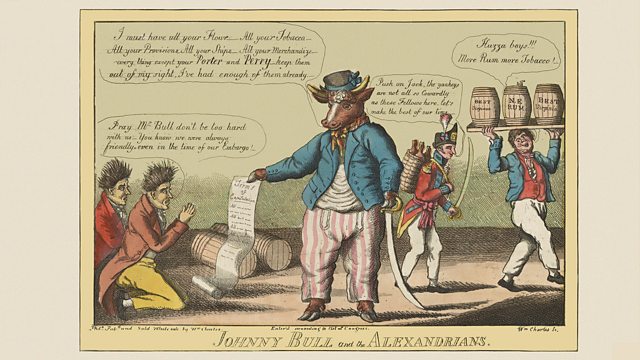John Bull
Melvyn Bragg and guests discuss John Arbuthnot's satirical figure, created in 1712 as an anthropomorphised bull, and its role as a representation of an English or British everyman.
Melvyn Bragg and guests discuss the origin of this personification of the English everyman and his development as both British and Britain in the following centuries. He first appeared along with Lewis Baboon (French) and Nicholas Frog (Dutch) in 1712 in a pamphlet that satirised the funding of the War of the Spanish Succession. The author was John Arbuthnot (1667-1735), a Scottish doctor and satirist who was part of the circle of Swift and Pope, and his John Bull was the English voter, overwhelmed by taxes that went not so much into the war itself but into the pockets of its financiers. For the next two centuries, Arbuthnot’s John Bull was a gift for cartoonists and satirists, especially when they wanted to ridicule British governments for taking advantage of the people’s patriotism.
The image above is by William Charles, a Scottish engraver who emigrated to the United States, and dates from 1814 during the Anglo-American War of 1812.
With
Judith Hawley
Professor of 18th Century Literature at Royal Holloway, University of London
Miles Taylor
Professor of British History and Society at Humboldt, University of Berlin
And
Mark Knights
Professor of History at the University of Warwick
Producer: Simon Tillotson
Last on
LINKS AND FURTHER READING
READING LIST
John Arbuthnot (eds Robert A. Erickson and Alan A. Bower), The History of John Bull (first published 1712; Oxford University Press, 1976)
Conal Condren, Satire, Lies and Politics: The Case of Dr Arbuthnot (Palgrave Macmillan, 1997)
Tamara L. Hunt, Defining John Bull: Political Caricature and National Identity in Late Georgian England (Routledge, 2003)
Mark Knights, Representation and Misrepresentation in Later Stuart Britain: Partisanship and Political Culture (Oxford University Press, 2006)
Mark Knights and Adam Morton (eds.), The Power of Laughter and Satire in Early Modern Britain, 1500-1820 (Boydell & Brewer, 2017)
Paul Langford, Englishness Identified: Manners and Character, 1650-1850 (Oxford University Press, 2000)
Peter Mandler, The English National Character: The History of an Idea from Edmund Burke to Tony Blair (Yale University Press, 2006)
Ben Rogers, Beef and Liberty: Roast Beef, John Bull and the English Nation (Chatto and Windus, 2003)
Miles Taylor, ‘John Bull and the Iconography of Public Opinion in England c.1712-1929’ (Past & Present, vol 134, issue 1, February 1992)
Adrian Teal, ‘Georgian John Bull’ (History Today, vol 64, issue 1, Jan 2014)
RELATED LINKS
Broadcasts
- Thu 30 Jun 2022 09:00�鶹������ҳ��� Radio 4
- Thu 30 Jun 2022 21:30�鶹������ҳ��� Radio 4
Featured in...
![]()
18th Century—In Our Time
Browse the 18th Century era within the In Our Time archive.
![]()
Culture—In Our Time
Popular culture, poetry, music and visual arts and the roles they play in our society.
In Our Time podcasts
Download programmes from the huge In Our Time archive.
The In Our Time Listeners' Top 10
If you’re new to In Our Time, this is a good place to start.
Arts and Ideas podcast
Download the best of Radio 3's Free Thinking programme.
Podcast
-
![]()
In Our Time
Melvyn Bragg and guests discuss the ideas, people and events that have shaped our world.



